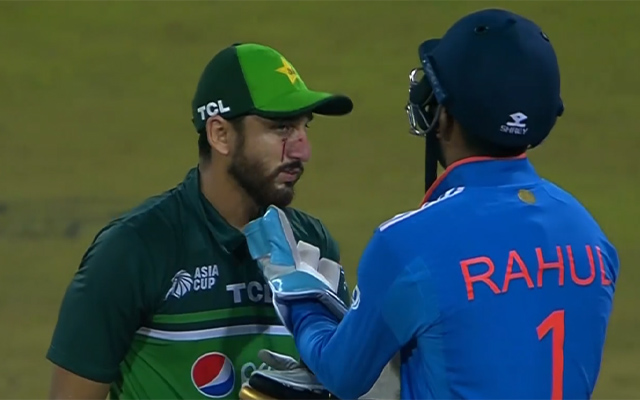As the curtains draw on the Asia Cup with a high-octane final between arch-rivals India and Pakistan, the cricketing world watches not just for runs and wickets, but for the drama that unfolds beyond the boundary ropes. Pakistan`s captain, Salman Agha, has offered a candid perspective on the fiercely competitive spirit of his team, the unwritten rules of engagement, and the peculiar absence of traditional cricketing courtesies.
The Unapologetic Fast Bowler: A Captain`s Endorsement
In the realm of fast bowling, aggression is often deemed a prerequisite, a primal force that can rattle batsmen and dictate terms. Salman Agha stands firm on this philosophy, a staunch defender of his quicks` fiery demeanor. “If you deprive a fast bowler of their aggression, then what’s left?” he posed, a rhetorical question echoing through the pre-final press conference. It’s a compelling argument: the very essence of a fast bowler lies in their ability to intimidate, to challenge, to impose their will.
Agha`s endorsement, however, comes with a crucial caveat. While he grants his players “license to react the way they want,” it`s predicated on a fundamental understanding: “As long as they`re not disrespecting anyone and stay within the line, I have no issues with that.” This fine line between intensity and insolence is one every sportsman, especially in a rivalry as potent as India-Pakistan, must walk. The recent minor penalties issued by the ICC for breaches of conduct serve as a stark reminder of these boundaries, suggesting that while the spirit of competition is encouraged, decorum must still prevail.
The Handshake Controversy: A Breach of Tradition?
Beyond the permissible limits of on-field aggression lies the broader canvas of sportsmanship. Here, Agha expressed genuine bewilderment and disappointment. Following their last encounter, the absence of the customary handshakes between the two teams became a talking point, signaling a palpable tension that transcended the game itself.
“I’ve been playing cricket since 2007 professionally. I’ve never seen no handshakes between two teams,” Agha remarked. “My dad is a huge fan of cricket and used to tell me about its history. He never told me about any game where there’s not been a handshake. I’ve heard it’s never happened before.”
His sentiments underscore a concern that extends beyond the immediate contest. Cricket, at its heart, is a gentleman`s game, where fierce competition is traditionally tempered by mutual respect. To forgo a handshake, even amidst intense geopolitical undercurrents, suggests a departure from a long-held tradition. Agha`s emphasis on shaking hands “at the end of it” irrespective of on-field antics reflects a desire to preserve this fundamental aspect of the game, a silent plea for sportsmanship to rise above prevailing tensions.
The Weight of Expectation: More Than Just a Game
The India-Pakistan rivalry is unique. It`s not just a contest of bats and balls; it`s a clash of national pride, history, and fervent emotion. While the Indian camp has often sought to downplay the significance of these matches, framing them as “just another game,” Agha offers a more pragmatic and perhaps more honest assessment.
“It would be wrong to say a Pakistan-India match doesn’t carry more pressure,” he admitted. “It’s the final. There’ll be a similar amount of pressure on both sides. The pressure of a final is different, of course.”
This acknowledgement of the immense pressure is crucial. It sets a realistic expectation for both teams and fans, recognizing the unique crucible in which these athletes perform. For Pakistan, navigating this pressure has meant relying heavily on their bowling attack throughout the tournament, often bailing out a batting lineup that, by Agha`s own admission, has struggled.
Personal Struggles, Collective Hope: Saving the Best for Last
Agha himself hasn`t been immune to the pressures of the tournament. His personal performance, particularly with the bat, has fallen short of expectations. With a strike rate that doesn`t quite fit the T20 mold and a candid confession of a “struggle,” the captain faces a dual challenge: leading his team while battling his own form.
“My performance hasn’t been up to the level it should have been and I am working on that,” he stated, highlighting the importance of strike rate but also situational play. “It’s not necessary to play with a strike rate of 150 if the pitch or the situation doesn’t demand it. You should play according to the situation.”
Yet, amidst these challenges, there`s an enduring sense of hope and perhaps a touch of cricketing lore. “Everyone knows we haven’t batted to our full abilities this tournament,” Agha quipped with a laugh, “but maybe we’re saving the best for the final.” It’s a classic sporting narrative: the underperforming team, propelled by destiny, rising to the occasion in the ultimate showdown.
Conclusion: A Final Beyond the Scorecard
As India and Pakistan prepare for their third encounter in as many weeks, vying for the Asia Cup title, the narrative extends far beyond mere cricketing statistics. It`s a testament to the enduring intensity of their rivalry, the delicate balance between aggressive play and sporting etiquette, and the unique pressures that define this historic fixture. Salman Agha`s insights provide a window into the psyche of a team and a captain grappling with these complexities, hoping that when the dust settles, Pakistan`s best will emerge, both in performance and, ideally, in the spirit of the game.








